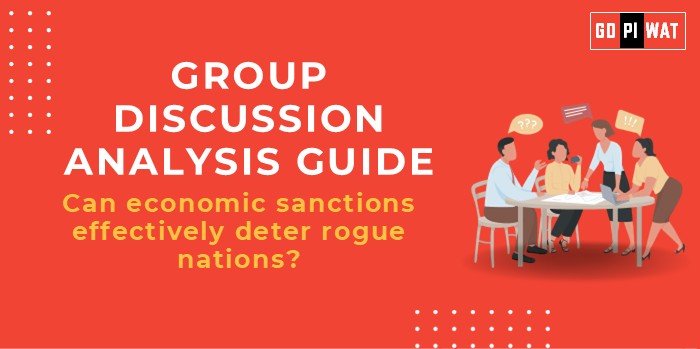📋 Group Discussion (GD) Analysis Guide
🌐 Can Economic Sanctions Effectively Deter Rogue Nations?
📖 Introduction to the Topic
Opening Context: Economic sanctions are a widely used diplomatic tool aimed at influencing the behavior of nations that violate international norms or engage in destabilizing actions. Their use has increased significantly in recent decades.
Topic Background: Sanctions have been applied for reasons such as nuclear proliferation (e.g., Iran, North Korea), military aggression (e.g., Russia’s actions in Ukraine), and human rights violations (e.g., Myanmar). While they are designed to pressure nations into compliance without resorting to military conflict, their effectiveness is a matter of global debate.
📊 Quick Facts and Key Statistics
- 🌍 Number of Countries Under Sanctions: Over 30 countries face active international sanctions.
- 📉 Russia’s Economic Losses: Estimated GDP contraction of 3.4% in 2022 due to sanctions related to Ukraine.
- 💰 Iran’s Oil Revenue: Declined by over 70% between 2011 and 2016 during international sanctions.
- 🌐 Global Support for Sanctions: Approximately 60% of surveyed UN member states support sanctions as a conflict resolution tool.
🌟 Stakeholders and Their Roles
- 🏛️ United Nations: Implements multilateral sanctions.
- 🌐 Individual Nations: Enforce unilateral sanctions (e.g., the US, EU).
- ⚖️ Target Nations: Countries subject to sanctions often experience economic and social hardship.
- 🏢 Private Sector: Plays a role in compliance (e.g., financial institutions, multinational corporations).
- 👥 Citizens: Directly affected by economic restrictions.
🏆 Achievements and Challenges
✨ Achievements
- ✅ Deterrence: Reduced nuclear ambitions in Iran under the Joint Comprehensive Plan of Action (JCPOA).
- 🌍 Global Consensus: Sanctions on apartheid-era South Africa supported its political transformation.
- 🔒 Economic Isolation: Restricted access to global finance for targeted nations.
⚠️ Challenges
- 🚨 Limited Compliance: North Korea continues nuclear tests despite decades of sanctions.
- 🤔 Humanitarian Concerns: Sanctions often harm civilian populations more than political elites.
- 📘 Global Comparisons:
– Effective: Sanctions helped end apartheid in South Africa.
– Ineffective: Continued economic resilience in Russia post-2022 sanctions.
💬 Structured Arguments for Discussion
- ✅ Supporting Stance: “Sanctions are effective as they isolate rogue nations economically and politically, making non-compliance increasingly unsustainable.”
- ❌ Opposing Stance: “Sanctions often fail to achieve their goals, disproportionately affect civilians, and can lead to unintended global economic consequences.”
- ⚖️ Balanced Perspective: “While sanctions can serve as a powerful diplomatic tool, their effectiveness depends on global unity, precision targeting, and minimizing humanitarian harm.”
💡 Effective Discussion Approaches
- 🌏 Opening Approaches:
- Highlight historical successes (e.g., South Africa).
- Present statistics on the economic impact of sanctions.
- 🤔 Counter-Argument Handling:
- Acknowledge Inefficiencies: Suggest reforms such as targeted sanctions.
- Alternative Measures: Compare sanctions to diplomacy or military intervention.
🔍 Strategic Analysis of Strengths and Weaknesses
- 💪 Strengths: Non-violent conflict resolution; global pressure without military involvement.
- ⚖️ Weaknesses: Risk of humanitarian crises; circumvention by nations with alternative allies.
- 📈 Opportunities: Global coalition-building; technological tools to enforce sanctions.
- ⚠️ Threats: Retaliatory economic measures; loss of credibility if sanctions fail.
🎓 Connecting with B-School Applications
- 🌍 Real-World Applications: Role of sanctions in shaping global trade policies or international relations coursework.
- 💬 Sample Interview Questions:
- “How can economic sanctions be made more effective in achieving their goals?”
- “Discuss the ethical implications of sanctions on civilian populations.”
- 💡 Insights for Students:
- Use sanctions as case studies for policy analysis.
- Explore global business risks associated with sanctions.


